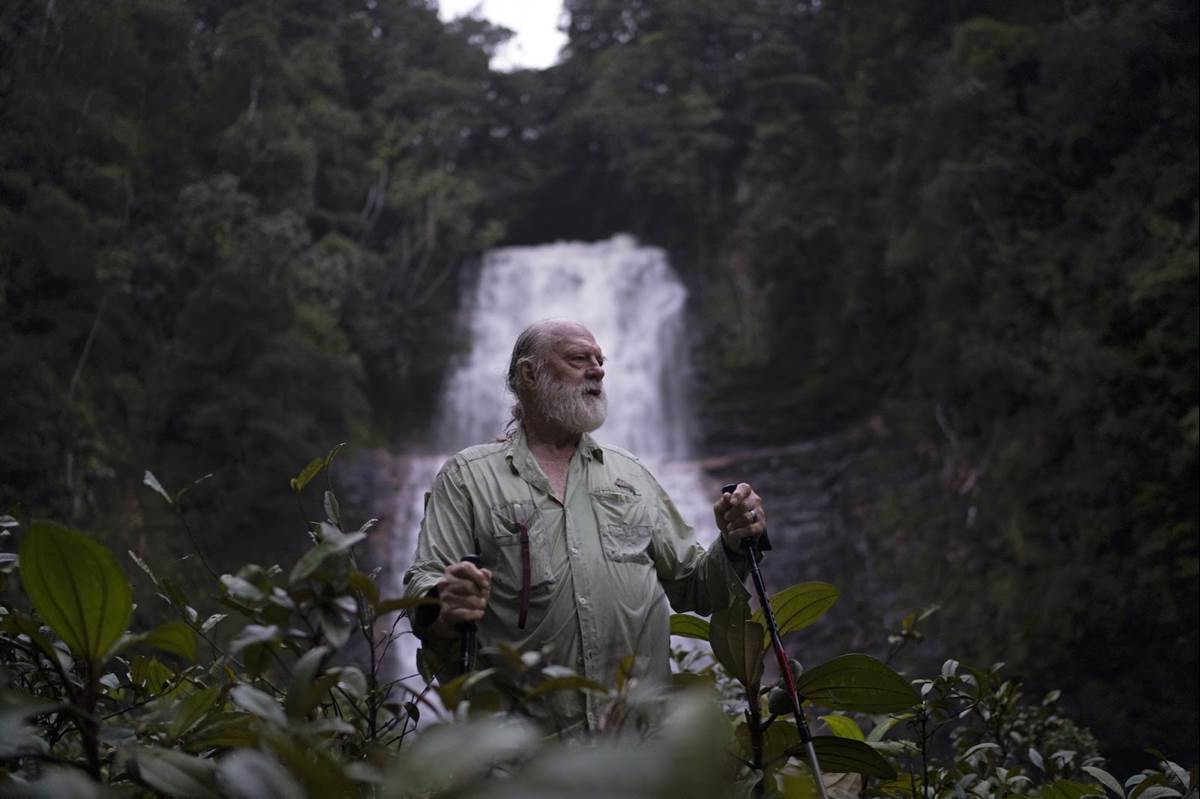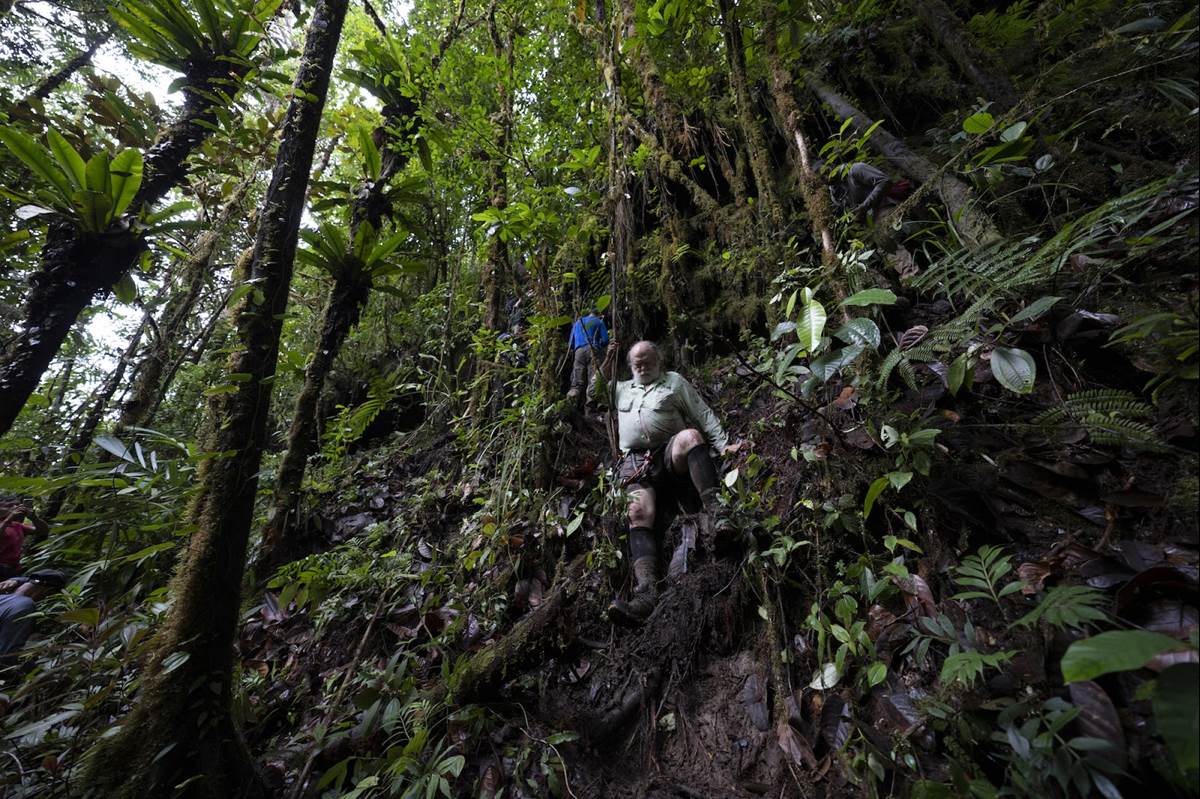In Explorer: The Last Tepui, we meet National Geographic Explorer Dr. Bruce Means whose infectious love of nature motivates the entire team. During his 50-year research career studying reptiles and amphibians, he has published 235 scientific articles; been involved in numerous documentaries with Nat Geo, BBC and PBS; and has discovered 14 new species, seven genera, two families, and multiple subfamilies and taxons. We were excited to get to spend time with the legendary Dr. Means, who insisted we called him Bruce, and learn more about his history and love of nature.

Biologist Bruce Means in front of the pristine Double Drop Falls of Guyana. (National Geographic/RYAN VALASEK)
Laughing Place:
The documentary and the article in National Geographic do a great job conveying the joy you have around your subjects. The documentary talks a lot about the culmination of your career, not that you're done by any means, but I wanted to focus a little bit more on the backstory on how you got interested in amphibians and other creatures. Where did your passion come from?
Bruce Means:
I thought about that and tried to figure that out myself for a long time. I'll try to make this short. I was born in a place when I was born, I hated it, Downtown Los Angeles. I was born in '41, so that was during World War II. My dad was off to war. And so every day I had to live between a house and a garage that had a little sandy runway between it with a wire screened gate on both ends. That's where all the women put me.
I mean, I had nothing to do but play with my trucks and the sand and the dirt, but across the yard, the next yard on the other side of the driveway, they had a pond, a little artificial pond. I guess I was three or four when I finally figured how to climb that fence. I climbed the gate. I climbed it, went over and I'd stand there watching this pond and there were goldfish in it. And little emergent plants and the like. That was my first biological experience, except the ladies used to tell me if I ever kept doing that, or if I weren't a good boy, the spiders were going to get me. And there were black little spiders. So they gave me a bad case of arachnophobia to start with.
My dad came back from World War II and he moved the whole family out to a wild little shack in the Calabasas Highlands of the Santa Monica Mountains. And there, I ran free. From the time I was like six until I was nine, I never went indoors. I chased potato bugs and lizards and snakes and anything that I could find, scorpions and tarantulas, put of them in jars. So I really enjoyed nature. But then in 1950, when I was nine, we migrated to Alaska over the Alcan Highway. And I spent all the rest of my teenage life in Alaska. We sort of semi-homesteaded there. We bought property from a homestead that had just been proved up and we built a huge log home over about a 10 year period. So I then had a whole different experience living in a wild part of Alaska and hunting for rabbits, and we shot moose out the back door one time. When I graduated from high school in '59, I chose Florida State University in North Florida
Once I got here, I fell in love with the Panhandle Florida, which is one of the three biodiversity hotspots of the United States and Canada. And it was largely unstudied and open to somebody like myself who was interested in nature to live in and do his research. So I got my PhD at FSU studying the ecology of Florida Panhandle and my career developed. And my work was on amphibians and reptiles. So somewhere along the line, I became enamored of those animals rather than birds and mammals, which most people sort of gravitate to. Whether it had to do with California, my early days in the Santa Monica Mountains, the chaparral and woodlands, or not, I don't know. But anyway, that's what happened.
So by studying animals like amphibians and reptiles or any animal, or even any plant, when you become an expert on a different group of organisms or a group, you then can see how different and species of that group interact together or don't because they're geographically isolated for reasons of different ecological evolutionary reasons. And or how they all interact together to form the ecosystem that they live in, which for a good ecologist, it opens up the whole Vesta of understanding ecology habitats and how species interact together. That's why I call myself an ecologist more than a herpetologist, although I truly am both.
Laughing Place:
It's a long way from Downtown Los Angeles to the magical world of the tepuis. For those of us that have just seen it through National Geographic, the magic still comes across, but what about that region excites you?
Bruce Means:
Most ecologists are trained in the temperate parts of the world: Europe, North America. And if you really want to be an ecologist, a good one, you need to understand something about what has happened in the tropical parts of the world, because the tropics have been around longer than the tempered zones ever have. During the waxing and waning of tempered environments or a racial periods, there's always been a tropical region.
So during my career, even as an undergraduate, I would take trips to Mexico or Costa Rica and Belize and other places to become somewhat familiar with the ecology of tropical environments. And then about 1985 I had an opportunity. I just decided I wanted to go down into Central Brazil to learn something about the Amazon Rainforest.
It's like a magnet. If you really want to understand nature, you want to go to the Amazon. So I put on a backpack and I took a bus, over a dirt road, they had just punched from Venezuela down to Manaus, Brazil. It's now a paved highway, but as I was doing that, I happened to see Mount Roraima way off in the distance, this high flat table-top mountain. I knew about Roraima, I knew about Arthur Conan Doyle's novel, The Lost World, which Roraima is thought to have stimulated him somewhat to write.
And so, I went back once or twice every year ever since then. First on my own expeditions, I climbed Mount Roraima, I climbed Auyantepui, I climbed about a dozen other tepuis, or I found ways to get to their summit. Eventually became an expert on the region and then was able to get grants and contracts. I fell in love with the tepuis and because they were in another area like North Florida has been for me where I could be a leading scientist doing major research on a wonderful part of the world. You can't do everything. You only have one life, but that got me started trying to round off my career to be as knowledgeable about a tropical environment as I am of a tempered world.

Bruce Means makes his way down treacherous terrain deep in the Guyanese Amazon. (National Geographic/RYAN VALASEK)
Laughing Place:
Everyone else we've talked to about this project speaks about your joy and the infectious nature of it. Being on Disney+, a youthful audience is going to fall in love with the tepuis. What do you hope they take away from the film?
Bruce Means:
You and any thinking American no doubt understands how badly were impacting the planet Earth. If you just read scientific information, you know about global climate change, you watch the Keeling Curve and see the carbon dioxide levels are going crazy. If you live on this planet for any length of time, you understand pollution and all kinds of problems that we're perpetrating against nature.
So it behooves all of us who appreciate nature to do everything we can through whatever medium we can, especially television and magazine articles and popular book articles and the like. Everything we can to stimulate people to understand how important nature really is. I mean, it really is important to us. We cannot live on a planet where the biodiversity reaches some threshold level; falls to some level below which it will not support the earth. And there's very good reason to believe that there is such a level. We hope we don't reach and find out, "Oh my goodness, it was this level. It came a lot quicker than we thought." But nature gives us so much: we get clothing, we get food, we get medicines out of all the creatures that occur in nature.
I feel I owe it back to society for having supported me through various means and ways: through my education, through grants and contracts I've gotten. I don't want to be a scientist that just does my thing and sticks my head in a hole in the ground and not convey to the world how exciting, how wonderful it is to be alive. I don't think I'm going anywhere when I pass away. I think when I'm gone, I'm gone. I mean, that's a philosophical point of view. So why not appreciate every single second you've got on the planet? Why not find joy in the fact that I woke up this morning and I wasn't in the obituary column?
My philosophy partly explains my glee for every minute I have on this planet. And my goodness, I just turned 81. I never dreamed I'd ever get to 81. The males in my line all passed away from heart problems in their early 60s. Fortunately, I've gone beyond that. I don't smoke, I don't drink anymore. I'd like a beer or two once a while, but my heart doctor says don't do it. And basically, I guess I'm lucky to have some pretty good genes because I've made it this far and I knock on wood. You know my next goal is?
Laughing Place:
No.
Bruce Means:
To reach 83, and in like three months, there's a day in there, well, I will have lived 30,000 days. And I keep a journal, and every once in a while I'll look up. I'm now at 29,500 something. If I get to 30,000, then I would like to go further, but if you don't set goals for yourself, what are you going to do? Sit around and watch TV all the time and mold away and croak early? Not me.
Laughing Place:
Well, I look forward to celebrating that with you. I hope we have a big National Geographic celebration when you reach that milestone.
Bruce Means:
You know what? That would be wonderful on top of another tepui.
Laughing Place:
Let's do it. Thank you so much for all you've done to share your insights into the natural world through your long and prestigious career. It's a wonderful documentary and your passion makes it all that more enticing.
Bruce Means:
My pleasure. Thank you.
You can check out National Geographic Explorer: The Last Tepui on Disney+ this Earth Day.
